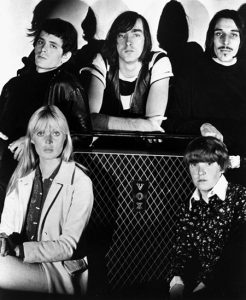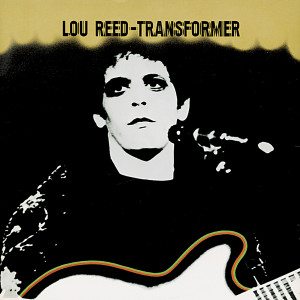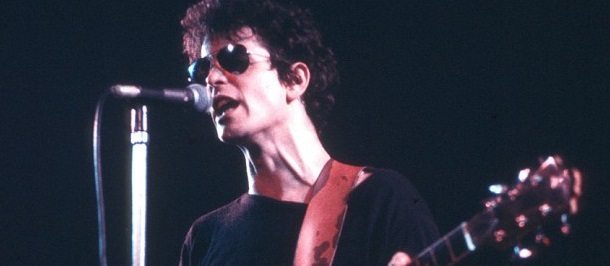Remembering Lou Reed
“Shiny, shiny, shiny boots of leather
Whiplash girlchild in the dark…”
With these lyrics, Lou Reed started a revolution. After spending his youth listening to the early rock & roll movement of the 1950s, Reed was ready to walk his own walk. Upon meeting John Cale and Andy Warhol in the underground art scene of 1960s New York, he formed a new sound in music with legendary proto-punk band The Velvet Underground. (You’ve probably heard of them.) Rock & roll music had – up until this point – been relatively safe; composed of angry love songs and brief flirtations with individualism.
But Lou Reed refused to succumb to such conventions, instead exploring the perverse, psychotic, and degenerate sexual underground of New York, accompanied by the cacophonous violins of John Cale. Together, and with the added support of German singer Nico,  they crafted one of the finest rock albums of all time in The Velvet Underground and Nico, which also features one of the oddest album covers ever, provided by Warhol himself. Whilst the album was met with critical indifference at the time of its release in 1967, it jump-started the New York underground music scene.
they crafted one of the finest rock albums of all time in The Velvet Underground and Nico, which also features one of the oddest album covers ever, provided by Warhol himself. Whilst the album was met with critical indifference at the time of its release in 1967, it jump-started the New York underground music scene.
Without Reed, punk-rock would have looked a lot different. In fact, the entire rock & roll landscape would have been different. With his heavy emphasis on taboo subject matter (such as sadomasochism, drug use, and sexual deviancy), Reed took rock music to places which nobody else was quite willing to fathom at the time. Whilst the album may not have been critically or financially successful, it touched a chord with almost every up-and-coming rock icon of the era. The glam stylings of David Bowie and Iggy Pop were informed by Reed’s music, as was the burgeoning punk scene, which of course featured such iconic groups as Black Flag, the Sex Pistols, and Dead Kennedys. Perhaps the most awe-inspiring fact of his influence is that it crosses genres and time. None of these acts sound overtly like The Velvet Underground, but the band’s DNA still carries through clearly.
However, Reed would not be the icon he was if he stopped with The Velvet Underground. After quitting the band in 1970, he began pursuing an equally interesting – and subversive – solo career. This resulted in 22 albums being released, with particular highlights including Transformer, Rock ‘n’ Roll Animal, The Blue Mask, New York, and so on. To talk about them in generalities would be doing each of them a disservice, so instead, I will discuss the one album which has had the greatest impact on me – and on culture at-large – his second album: Transformer (which was produced by fanboy Bowie; at this point a great musician in his own right).
Whilst it would be wrong to say that Reed abandoned the subversive elements of The Velvet Underground entirely, there is certainly less provocative material in this album, perhaps a large contributor to its overall commercial success, which was greater than anything released in the Velvet Underground-era. Nevertheless, the anger is still pristine; this time focused on complicated relationships (‘Vicious’ and ‘Hangin’ ’Round’) and the seedy underbelly of New York life. Even so, Transformer is most noted for two of  Reed’s most popular songs: ‘Perfect Day’ and ‘Walk on the Wild Side’. The former would go on to be re-recorded in 1997 by the BBC for Children In Need: a project which incorporated a vast array of talent into its fold, including Bono, Bowie, Elton John, Tom Jones, and many others.
Reed’s most popular songs: ‘Perfect Day’ and ‘Walk on the Wild Side’. The former would go on to be re-recorded in 1997 by the BBC for Children In Need: a project which incorporated a vast array of talent into its fold, including Bono, Bowie, Elton John, Tom Jones, and many others.
To try and sum up the career, influence and pervading presence of Lou Reed in a single article would be borderline disrespectful. Instead, I point you towards his work: no testament to his talent is enough. You have to listen to him, because his music was him. He shared with us all something so special that it will never be repeated by another. He is one of a handful of musicians who realised the full potential of rock music, turning it from simple hedonism into an operatic art form. It encompassed the entire spectrum of human experience, from the degradation of the human spirit to the utter heights of happiness and imagination.
Reed passed away on the 27th of October this year. His last message posted on Facebook was a photograph of a door with a poster of him on it, set in a dirty alleyway. His wife, Laurie Anderson said they spent the last week of his life in Long Island, among nature. She has announced that he passed away “looking at the trees and doing the famous 21 form of tai chi with just his musician hands moving through the air”. The guy was invincible. He lived and fought through so much, and he survived into his old age. His passing genuinely shocks me, as it does many others, and it will take a while to come to grips with it. I can see him now, at a bar somewhere, trading stories with the likes of Jimi and Kurt and Elvis. He’s joined their ranks now: a small cluster of provocateurs and immortals.
And to those who have not yet heard his music, now is the perfect time to start. So hey, babe; take a walk on the wild side.

Comments